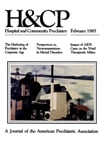Vietnam Veterans in the General Hospital
Abstract
Posttraumatic stress disorder is now well known to occur among Vietnam combat veterans. The interest in this diagnosis may have caused an unintentional neglect of veterans with problems that do not meet the strict criteria of DSM-III for this disorder. The authors studied 300 Vietnam veterans admitted to a general hospital to determine their level of symptomatology and to gather data on this previously unstudied group. More than 75 percent of the sample were medical-surgical patients; about 50 percent had high levels of depression and symptoms of posttraumatic stress disorder, or both. Combat veterans were considerably more symptomatic; more than 50 percent of the patients with the highest levels of combat activity were on nonpsychiatric wards. The authors suggest the need to identify Vietnam veterans on medical and surgical wards. Reluctance to talk about war experiences makes Vietnam veterans a group likely to be overlooked.
Access content
To read the fulltext, please use one of the options below to sign in or purchase access.- Personal login
- Institutional Login
- Sign in via OpenAthens
- Register for access
-
Please login/register if you wish to pair your device and check access availability.
Not a subscriber?
PsychiatryOnline subscription options offer access to the DSM-5 library, books, journals, CME, and patient resources. This all-in-one virtual library provides psychiatrists and mental health professionals with key resources for diagnosis, treatment, research, and professional development.
Need more help? PsychiatryOnline Customer Service may be reached by emailing [email protected] or by calling 800-368-5777 (in the U.S.) or 703-907-7322 (outside the U.S.).



